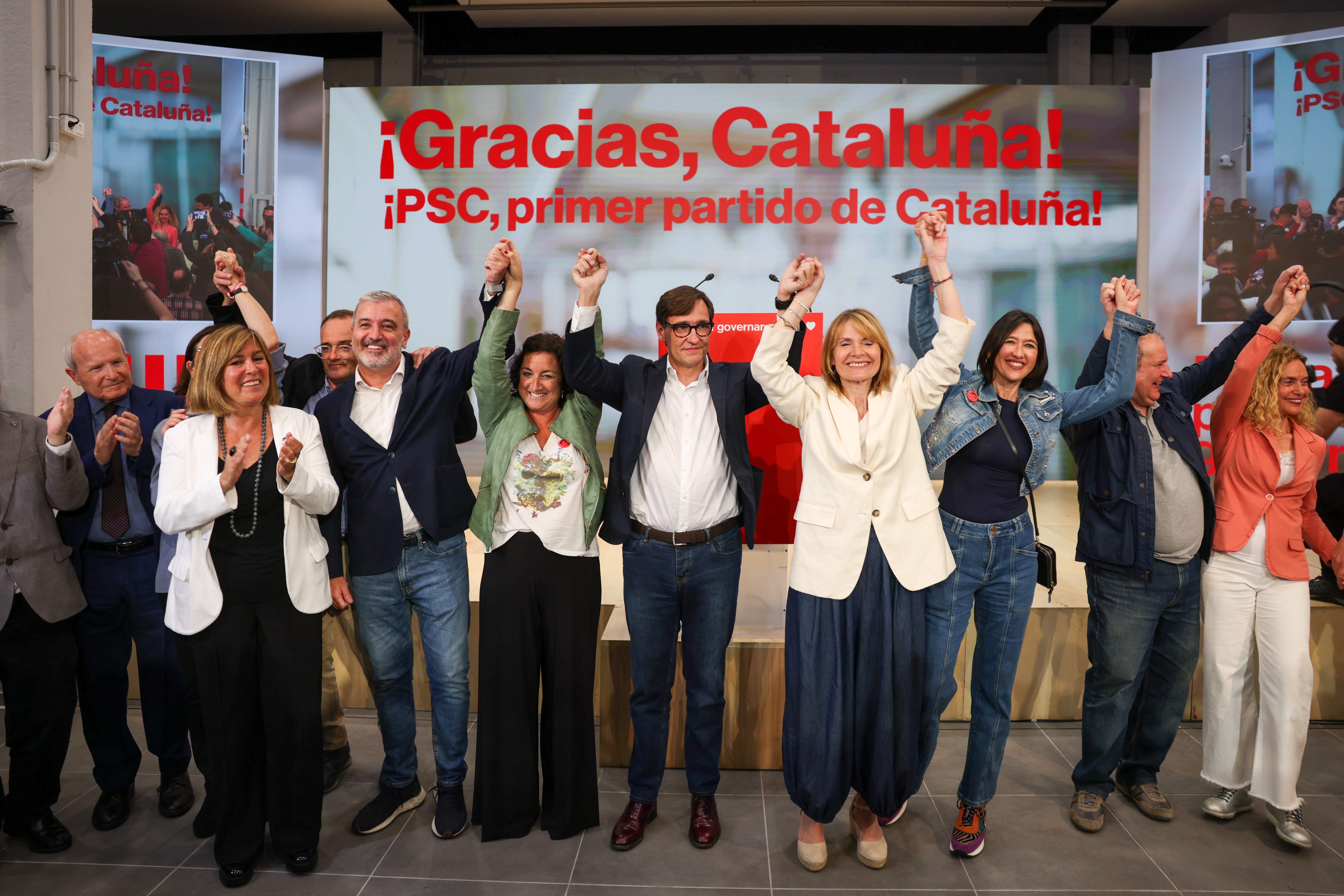The forecasts were right and the PSC has celebrated at its Barcelona headquarters. The Catalan Socialist Party (PSC) has won decisively in the election to the Parliament of Catalonia this Sunday and the result leaves it very close to entering the Palau de la Generalitat 14 years after the last Socialist president departed. The PSC repeats as the largest party in the Catalan chamber, after winning narrowly on February 14th, 2021. This year, though, the positive sensations at the beginning of election night were translated into a clear win for Salvador Illa, who obtained 42 deputies and 28.3% of the votes, a rise of 9 seats and 5.2 percentage points compared to the previous election. The voter turnout was low on a day marked by rail chaos on Catalonia's Rodalies lines, with both the main pro-independence candidatures, Junts+ Puigdemont for Catalonia and Catalan Republican Left (ERC) demanding that the Electoral Commission grant an extension of voting time due to this major failure of the suburban train network. But Illa's victory is large enough, unlike in previous elections, to let him assemble a majority to reach the presidency of the Generalitat, as head of a new Catalan government. This is not only due to the difference over second-placed Junts+, of seven percentage points, but due to the fact that, after 14 years of pro-independence governments, the parties seeking a state of their own have, for the first time, failed to collectively win an absolute majority of seats.
🔴 All our Catalan election coverage in English
🔴 Full results of the Catalan election 2024
In this respect, the Catalan president-in-exile, Carles Puigdemont, has broken the close parity that has existed between the Junts political space and ERC since 2015. His list, combining Junts members with a number of independents, has come in second place with 21.3% of the votes and 36 parliamentarians, resulting in an increase of 4 seats and a 1.2% rise in votes. With this result, Catalonia enters a new post-independence process phase.
Disaster for ERC, with its worst result since 2010
In turn, the current president of the Generalitat and ERC candidate, Pere Aragonès, suffered a resounding electoral setback and the party fell to third position, dropping to 20 seats (13.7% of the votes). With this result, the Republicans obtained their worst result since the beginning of the independence process, falling to even lower levels than in 2010.
PP overtakes Vox and rises from 3 to 15 seats
On the other hand, the tight fight among the Spanish nationalist parties, the People's Party (PP) and far-right Vox has tilted towards the conservatives under Alejandro Fernández. The PP quintupled their results of 2021 and have stormed into fourth position, with 15 deputies and 10.9% of votes, with 11 new parliamentarians and a rise of 7 percentage points. It is their best result since 2012. And, despite falling behind the PP, the expectations of Ignacio Garriga's Vox have been realized because they have consolidated their result of 2021. The far-right party has obtained 11 parliamentarians despite being overtaken by Feijóo's party, with 8.1% of the total vote, that is to say, half a percentage point more than in 2021.
Far-right Catalan Alliance wins seats; left-wing CUP and Comuns Sumar lose support
As for the other three parties with parliamentary representation, it is worth noting that Catalan Alliance (AC) has entered the Catalan chamber for the first time. The Islamophobic party enters Parliament with two seats and 3.8% of votes, having a presence in the constituencies of Girona (where it won 10% of the votes) and Lleida. The rise of the party led by Sílvia Orriols, mayor of Ripoll, contrasts with the decline of the radical-left, pro-independence CUP, although the far-right party did not overtake the anti-capitalists. The candidacy headed by Laia Estrada has lost momentum compared to February 14th, 2021 and has obtained 4 MPs and 4.1% of the vote.
Finally, the increase in the PSC also explains, in part, the decline suffered by the alternative left party Comuns Sumar. Jéssica Albiach's list saves its presence due to support in Barcelona (the only constituency where it has obtained representation), with 6 representatives and 5.8% of the total vote. On the other hand, the anti-independence Ciudadanos (Cs) disappear from the Parliament of Catalonia and the party is headed for extinction. Carlos Carrizosa's group even fell behind the animal rights party PACMA and did not even reach 1% of the total vote. As for the other pro-independence candidacy, the party Alhora led by Clara Ponsatí and Jordi Graupera, it fails badly in its first attempt to reach Parliament, with around 0.4% of the vote.
Possible parliamentary majorities for the PSC: the left-wing tripartite is viable
With the loss of the pro-independence majority (the bloc totals 59 with Junts, ERC, and the CUP; with, in addition, the two far-right seats of AC), there are several scenarios open to Salvador Illa to be able to form a majority that will allow him to reach the presidency of the Generalitat. At the outset, the sum of "progressive" parties with ERC and Comuns-Sumar reaches 68 seats, the magic number for a majority in Parliament, this being the main hypothesis for Illa to be the 133rd president of the Generalitat; while he could also reach a majority with Junts+ Puigdemont for Catalonia (77 seats in total). At the same time, if a pro-Spanish axis wanted to rely on non-Catalanist partners such as the PP and Comuns Sumar, they would also have to include Vox in the equation.

